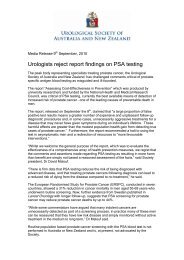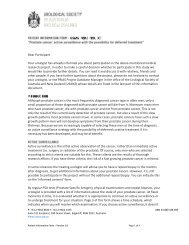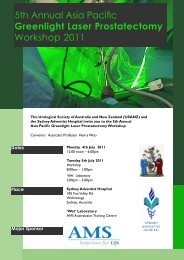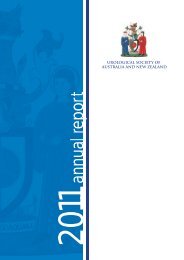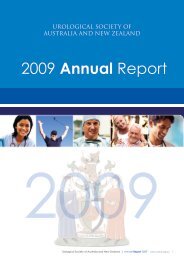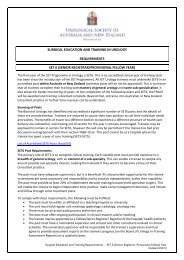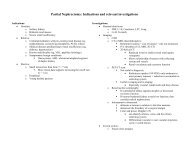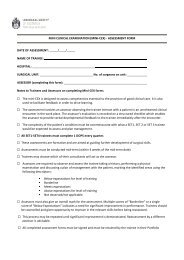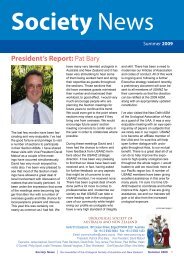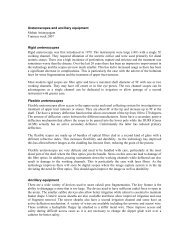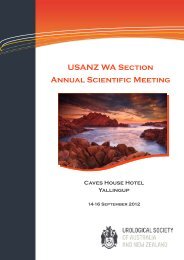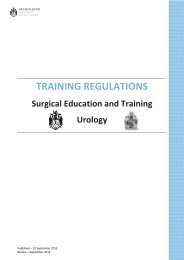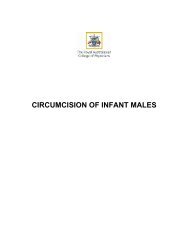SET 2 Trainee Assessment Report - Urological Society of Australia ...
SET 2 Trainee Assessment Report - Urological Society of Australia ...
SET 2 Trainee Assessment Report - Urological Society of Australia ...
Create successful ePaper yourself
Turn your PDF publications into a flip-book with our unique Google optimized e-Paper software.
BOARD OF UROLOGY<br />
IN‐TRAINING ASSESSMENT FORM<br />
<strong>SET</strong> 2 TRAINEE<br />
TRAINEE INFORMATION<br />
Name:<br />
<strong>Assessment</strong> Period: Q1 Q2 Q3 Q4 Calendar Year:<br />
No. Days Absent: Annual Leave Exam Sick Study Other<br />
HOSPITAL INFORMATION<br />
Hospital Name:<br />
Name <strong>of</strong> Unit:<br />
No <strong>of</strong> Consultants:<br />
Training Supervisor:<br />
Name and signature <strong>of</strong> trainers who contributed to this assessment<br />
<br />
<br />
<br />
All consultants in a Unit are expected to contribute to this assessment.<br />
The recorded scores should reflect consensus.<br />
Only 1 form should be used to record the assessment<br />
Name Signature Name Signature<br />
SIGNATURE OF TRAINING SUPERVISOR<br />
I verify that ALL consultants on the Unit have contributed to this assessment and that the assessment and<br />
logbook data have been discussed with the trainee.<br />
Name: Signature: Date:<br />
DECLARATION BY TRAINEE (These statements must be answered)<br />
I have sighted the assessment on this form<br />
Yes No<br />
I have discussed the assessment with my Training Supervisor Yes No<br />
I agree with the assessment on this form<br />
Yes No<br />
Name: Signature: Date:<br />
SIGNATURE OF SECTION TA&E CHAIRPERSON<br />
Name: Signature: Date:<br />
BOARD OF UROLOGY Page 1<br />
Royal Australasian College <strong>of</strong> Surgeons & <strong>Urological</strong> <strong>Society</strong> <strong>of</strong> <strong>Australia</strong> and New Zealand
COURSES OR EXAMS COMPLETED THIS YEAR<br />
SECTION 1 – to be completed BEFORE <strong>Assessment</strong> Interview<br />
AS<strong>SET</strong> CCrISP EMST CLEAR<br />
Surgical Sciences Examination (Generic)<br />
MEETINGS ATTENDED THIS YEAR<br />
Clinical Examination<br />
Section Meeting USANZ ASM USANZ <strong>Trainee</strong> Week<br />
Name the Conference you have attended or will attend this year to comply with the Urology training requirement<br />
<strong>of</strong> attending one conference (additional to your Section urology meeting) in <strong>SET</strong> 2.<br />
WORKSHOPS CONFERENCES OR MEETINGS ATTENDED ‐ TECHNICAL SKILLS<br />
(medical knowledge, surgical skills, etc) this term only<br />
WORKSHOPS CONFERENCES OR MEETINGS ATTENDED ‐ NON‐TECHNICAL SKILLS<br />
(Teamwork, Communication, Leadership, Management, etc) this term only<br />
PRESENTATIONS GIVEN (within hospital network) this term only<br />
PRESENTATIONS GIVEN (outside hospital network) this term only<br />
RESEARCH (include all commenced, completed, or contributed to) this term only<br />
BOARD OF UROLOGY Page 2<br />
Royal Australasian College <strong>of</strong> Surgeons & <strong>Urological</strong> <strong>Society</strong> <strong>of</strong> <strong>Australia</strong> and New Zealand
TEACHING RESPONSIBILITIES AND OPPORTUNITIES PROVIDED (this term only)<br />
Provide details <strong>of</strong> any teaching you have provided to medical students, nurses, junior doctors, or allied health<br />
pr<strong>of</strong>essionals.<br />
Outline the teaching simulation workshop program your hospital network made available to you in the nontechnical<br />
competencies (teamwork, communication, leadership, management etc).<br />
Outline the teaching simulation workshop program your hospital network made available to you in the technical<br />
competencies (surgical skills, etc).<br />
Outline the structured education program in surgery provided by your hospital network which was directed to<br />
you, and you were able to attend during this term. This may be scheduled for all surgical <strong>SET</strong> 1s, or all General<br />
Surgery <strong>SET</strong> 1s.<br />
List the mini‐CEXs you have undertaken with one <strong>of</strong> your trainers this assessment period<br />
List the DOPS you have undertaken with one <strong>of</strong> your trainers this assessment period<br />
BOARD OF UROLOGY Page 3<br />
Royal Australasian College <strong>of</strong> Surgeons & <strong>Urological</strong> <strong>Society</strong> <strong>of</strong> <strong>Australia</strong> and New Zealand
SECTION 2 – TO BE COMPLETED BY SURGICAL SUPERVISORS<br />
KNOWLEDGE, SKILLS AND APPLICATION (Part 1)<br />
Provides an assessment <strong>of</strong> the trainee’s knowledge <strong>of</strong> the basic sciences (anatomy, physiology, pathology), their<br />
efforts to improve knowledge during the term, and their ability to apply their knowledge appropriately in the<br />
clinical setting.<br />
EXPLANATION OF RATINGS<br />
MET expectations; performed in a manner expected for <strong>SET</strong> level<br />
Just below expectations; repeated mild deficiency, and need for some improvement<br />
Significantly below expectations; needs immediate and substantial remedial attention.<br />
1. Assess the level <strong>of</strong> general surgical and basic scientific knowledge this<br />
trainee demonstrated to you.<br />
2. How well did this trainee apply their newly learnt knowledge to the<br />
clinical setting?<br />
3. Did this trainee convince you they had an interest in learning, and<br />
followed a reading program?<br />
MET Just below Signif<br />
below<br />
Comments<br />
BOARD OF UROLOGY Page 4<br />
Royal Australasian College <strong>of</strong> Surgeons & <strong>Urological</strong> <strong>Society</strong> <strong>of</strong> <strong>Australia</strong> and New Zealand
KNOWLEDGE, SKILLS AND APPLICATION (Part 2)<br />
Provides an assessment <strong>of</strong> the trainee’s interpretation <strong>of</strong> clinical situations, their use and interpretation <strong>of</strong><br />
investigations, and the application <strong>of</strong> their knowledge to individual cases.<br />
EXPLANATION OF RATINGS<br />
MET expectations; performed in a manner expected for <strong>SET</strong> level<br />
Just below expectations; repeated mild deficiency, and need for some improvement<br />
Significantly below expectations; needs immediate and substantial remedial attention.<br />
1. Assess the ability <strong>of</strong> this trainee to accurately elicit and interpret symptoms<br />
and signs, and select the needed investigation to use?<br />
2. Assess case presentations, particularly in hand‐over or when getting advice<br />
by telephone – were they succinct and inclusive <strong>of</strong> all relevant information,<br />
with the important issues highlighted?<br />
3. Assess the confidence you felt with this trainee making independent<br />
decisions, and guiding inpatient management?<br />
4. Assess the clinical judgement <strong>of</strong> this trainee ‐ were they astute in recognising<br />
early signs <strong>of</strong> complication, early signs <strong>of</strong> clinical deterioration, and accurate<br />
when suggesting urgent intervention?<br />
MET<br />
Just<br />
below<br />
Signif<br />
below<br />
Comments<br />
BOARD OF UROLOGY Page 5<br />
Royal Australasian College <strong>of</strong> Surgeons & <strong>Urological</strong> <strong>Society</strong> <strong>of</strong> <strong>Australia</strong> and New Zealand
KNOWLEDGE, SKILLS AND APPLICATION (Part 3)<br />
Provides an assessment <strong>of</strong> the trainee’s potential to learn the skills to perform safe surgery, and show an<br />
awareness <strong>of</strong> the responsibility a surgeon has to self, patients, and others<br />
EXPLANATION OF RATINGS<br />
MET expectations; performed in a manner expected for <strong>SET</strong> level<br />
Just below expectations; repeated mild deficiency, and need for some improvement<br />
Significantly below expectations; needs immediate and substantial remedial attention.<br />
1. Assess this trainee’s preparation for procedures – did they check<br />
equipment, and review the steps <strong>of</strong> any procedure prior to commencing?<br />
2. Assess this trainee’s knowledge <strong>of</strong> needles and instruments ‐ did they make<br />
the right selection for the right task, and know why their choice was the<br />
most appropriate?<br />
3. Assess this trainee’s manipulative skills and dexterity ‐ are they appropriate<br />
and developing at the expected rate?<br />
4. Assess this trainee’s approach to human tissue ‐ do they handle tissue<br />
gently, avoiding force or careless tissue damage?<br />
5. Assess this trainee’s knowledge <strong>of</strong> surgical anatomy, anatomical relations,<br />
and the physical properties <strong>of</strong> different tissues as they are necessary to<br />
perform safe surgery.<br />
6. Assess the ability <strong>of</strong> this trainee to accept and implement surgical<br />
instruction and advice.<br />
MET<br />
Just<br />
below<br />
Signif<br />
below<br />
Comments<br />
BOARD OF UROLOGY Page 6<br />
Royal Australasian College <strong>of</strong> Surgeons & <strong>Urological</strong> <strong>Society</strong> <strong>of</strong> <strong>Australia</strong> and New Zealand
SUMMARY OF PROCEDURES AND EXPECTED EXPOSURE & COMPETENCE<br />
KEY TO RATINGS<br />
1 Limited experience at this stage, acquiring introductory skills<br />
2 Consistently undertaking aspects <strong>of</strong> the procedure<br />
3 Fluent with principles but at this stage unable to complete independently<br />
4 Able to perform straightforward cases but requires assistance with the difficult or complex<br />
5 Able to perform independently and competently<br />
N/A Unable to assess due to lack <strong>of</strong> exposure during this term<br />
1. Endoscopy (sound spatial orientation and endoscopic manipulation) 1 2 3 4 5 N/A<br />
2. Safe suturing and knot tying 1 2 3 4 5 N/A<br />
3. Safe surgical dissection and haemostasis 1 2 3 4 5 N/A<br />
4. Safe open surgical access to the abdomen and/or pelvis 1 2 3 4 5 N/A<br />
5. Familiarity with the surgical anatomy, orientation, and relations <strong>of</strong> the<br />
abdominal contents<br />
1 2 3 4 5 N/A<br />
6. Ability to differentiate healthy from diseased abdominal organs 1 2 3 4 5 N/A<br />
7. Familiarity with intra‐abdominal and pelvic vascular anatomy 1 2 3 4 5 N/A<br />
8. Ability to fashion an enteric stoma 1 2 3 4 5 N/A<br />
9. Hand sewn anastomosis <strong>of</strong> a hollow viscus 1 2 3 4 5 N/A<br />
10. Safe use <strong>of</strong> stapling devices 1 2 3 4 5 N/A<br />
11. Safe layered closure <strong>of</strong> an abdominal wound 1 2 3 4 5 N/A<br />
12. Safe laparoscopic access to the abdomen 1 2 3 4 5 N/A<br />
13. Safe basic laporoscopic dissection eg cholecystectomy 1 2 3 4 5 N/A<br />
Comments<br />
BOARD OF UROLOGY Page 7<br />
Royal Australasian College <strong>of</strong> Surgeons & <strong>Urological</strong> <strong>Society</strong> <strong>of</strong> <strong>Australia</strong> and New Zealand
PROFESSIONALISM<br />
Pr<strong>of</strong>essionalism includes such issues as conduct, presentation, respecting confidentiality, and maintaining open<br />
disclosure, as well as learning ethical principles, always acting within personal capabilities, accepting responsibility<br />
for own actions, and continually striving for self‐improvement.<br />
EXPLANATION OF RATINGS<br />
MET expectations; performed in a manner expected for <strong>SET</strong> level<br />
Just below expectations; repeated mild deficiency, and need for some improvement<br />
Significantly below expectations; needs immediate and substantial remedial attention.<br />
1. Did this trainee recognise the limits <strong>of</strong> his or her ability, and reliably ask for<br />
advice or assistance when it was appropriate?<br />
2. Was this trainee dependable, contactable, and have requests completed in<br />
good time?<br />
3. Was this trainee ready to accept responsibility for their actions, learning<br />
from events without making excuses and deflecting blame?<br />
4. Assess the punctuality, personal presentation, and general enthusiasm <strong>of</strong><br />
this trainee in the workplace.<br />
5. Assess the ability <strong>of</strong> this trainee to obtain informed consent by fully<br />
explaining the nature and risks <strong>of</strong> interventions.<br />
6. How did this trainee behave in times <strong>of</strong> stress, frustration, or conflict?<br />
MET<br />
Just<br />
below<br />
Signif<br />
below<br />
7. How did this trainee react to feedback or criticism? Did they constructively<br />
use the information to measure and improve their performance rather than<br />
denying events or making excuses?<br />
Comments<br />
BOARD OF UROLOGY Page 8<br />
Royal Australasian College <strong>of</strong> Surgeons & <strong>Urological</strong> <strong>Society</strong> <strong>of</strong> <strong>Australia</strong> and New Zealand
COLLABORATION<br />
A team structure is needed to provide quality health care, and each team member must respect others and be cooperative.<br />
The contributions <strong>of</strong> all team members must be valued. Opinions <strong>of</strong> medical, nursing, and allied health<br />
colleagues may help you form your opinions in this assessment.<br />
EXPLANATION OF RATINGS<br />
MET expectations; performed in a manner expected for <strong>SET</strong> level<br />
Just below expectations; repeated mild deficiency, and need for some improvement<br />
Significantly below expectations; needs immediate and substantial remedial attention.<br />
1. Assess this trainee’s performance providing timely and constructive consults<br />
or advice when asked by other disciplines?<br />
2. How well did this trainee treat juniors and non‐medical (clerical etc) staff<br />
when compared to their treatment <strong>of</strong> peers or seniors?<br />
3. How well and fairly did this trainee co‐operate with peers when organising<br />
leave, rosters, clinical and administrative Unit duties.<br />
4. Assess this trainee’s performance in the clinical team. Did they make a<br />
positive and constructive contribution, rather than being disruptive and<br />
giving personal needs priority?<br />
5. Rate this trainee’s interactions with other disciplines. Were they respectful<br />
and positive, demonstrating insight regarding the usefulness <strong>of</strong> consultation<br />
or advice from other teams? This includes dealings with Emergency<br />
Departments<br />
MET<br />
Just<br />
below<br />
Signif<br />
below<br />
Comments<br />
BOARD OF UROLOGY Page 9<br />
Royal Australasian College <strong>of</strong> Surgeons & <strong>Urological</strong> <strong>Society</strong> <strong>of</strong> <strong>Australia</strong> and New Zealand
MANAGEMENT AND LEADERSHIP<br />
In their role as senior clinicians, surgeons are required to provide leadership, provide advice on the need for and<br />
distribution <strong>of</strong> health care resources, and be a role model and mentor to junior doctors and other health care<br />
pr<strong>of</strong>essionals. Junior <strong>Trainee</strong>s should be starting to understand these concepts.<br />
EXPLANATION OF RATINGS<br />
MET expectations; performed in a manner expected for <strong>SET</strong> level<br />
Just below expectations; repeated mild deficiency, and need for some improvement<br />
Significantly below expectations; needs immediate and substantial remedial attention.<br />
1. Assess the extent this trainee made themselves available to junior team<br />
members, to give advice, guidance and feedback.<br />
MET<br />
Just<br />
below<br />
Signif<br />
below<br />
2. Assess the quality and timeliness <strong>of</strong> medical records (operation reports,<br />
letters, and inpatient notes) completed by this trainee.<br />
3. Assess the performance <strong>of</strong> this trainee in undertaking the essential nonclinical<br />
(organisational) tasks <strong>of</strong> the Unit.<br />
Comments<br />
BOARD OF UROLOGY Page 10<br />
Royal Australasian College <strong>of</strong> Surgeons & <strong>Urological</strong> <strong>Society</strong> <strong>of</strong> <strong>Australia</strong> and New Zealand
HEALTH ADVOCACY<br />
A doctor must be aware <strong>of</strong> the factors that affect the health <strong>of</strong> our community, how a patient’s personal beliefs<br />
may influence their treatment choice, how allocating funds to one area <strong>of</strong> health care can reduce the resources<br />
available for other areas, and how the personal health <strong>of</strong> a doctor can affect the quality <strong>of</strong> the health care he or<br />
she provides.<br />
EXPLANATION OF RATINGS<br />
MET expectations; performed in a manner expected for <strong>SET</strong> level<br />
Just below expectations; repeated mild deficiency, and need for some improvement<br />
Significantly below expectations; needs immediate and substantial remedial attention.<br />
1. Did this trainee refrain from working when impaired, understanding that<br />
their health impacts on their performance?<br />
MET<br />
Just<br />
below<br />
Signif<br />
below<br />
2. Did this trainee recognise that economics need to be considered when<br />
ordering tests, and choosing treatment?<br />
3. Did this trainee recognise that patient factors and wishes need to be<br />
considered when choosing treatments for individuals?<br />
4. Did this trainee show sensitivity and compassion when dealing with people<br />
<strong>of</strong> religious, racial, and other minorities?<br />
5. Did this trainee comply with safe work hours, recognising the impact long<br />
hours can have on their ability to perform safely?<br />
6. Did this trainee comply with your Unit policies and protocols, which are<br />
systems in place to improve consistency and patient safety? <strong>Trainee</strong>s<br />
sometimes want to use the protocols they are used to, and such changes<br />
increase the risk <strong>of</strong> error.<br />
Comments<br />
BOARD OF UROLOGY Page 11<br />
Royal Australasian College <strong>of</strong> Surgeons & <strong>Urological</strong> <strong>Society</strong> <strong>of</strong> <strong>Australia</strong> and New Zealand
COMMUNICATION<br />
A doctor must develop positive relationships with others, respecting confidentiality and autonomy. Efforts must be<br />
made to adjust the manner and language <strong>of</strong> communication to suit the needs <strong>of</strong> each individual, and their manner<br />
must encourage questioning.<br />
EXPLANATION OF RATINGS<br />
MET expectations; performed in a manner expected for <strong>SET</strong> level<br />
Just below expectations; repeated mild deficiency, and need for some improvement<br />
Significantly below expectations; needs immediate and substantial remedial attention.<br />
1. Assess the quality <strong>of</strong> this trainee’s communication with patients and<br />
their relatives. Can they pitch their language to the level <strong>of</strong> each patient,<br />
and remain receptive to questions?<br />
MET<br />
Just<br />
below<br />
Signif<br />
below<br />
2. Assess the quality <strong>of</strong> this trainee’s communication with work colleagues.<br />
Can they pitch their communication appropriately so they are<br />
understood, and be open to constructive dialogue?<br />
3. Assess the general reputation <strong>of</strong> this trainee for accessibility, attitude,<br />
cooperation and communication within the workplace.<br />
4. How did this trainee respond when challenged with criticism,<br />
questioning, or even frank aggression?<br />
Comments<br />
BOARD OF UROLOGY Page 12<br />
Royal Australasian College <strong>of</strong> Surgeons & <strong>Urological</strong> <strong>Society</strong> <strong>of</strong> <strong>Australia</strong> and New Zealand
SCHOLAR AND TEACHER<br />
A surgeon is expected to be keen to learn, to know how to access and interpret information, and be committed to<br />
teach others and improve their own teaching skills.<br />
EXPLANATION OF RATINGS<br />
MET expectations; performed in a manner expected for <strong>SET</strong> level<br />
Just below expectations; repeated mild deficiency, and need for some improvement<br />
Significantly below expectations; needs immediate and substantial remedial attention.<br />
1. When a gap was found in this trainee’s knowledge, did they promptly read<br />
the topic, or was the gap still there next time?<br />
MET<br />
Just<br />
below<br />
Signif<br />
below<br />
2. Did this trainee regularly attend teaching sessions, participate in discussions,<br />
and optimise learning by pre‐reading the topics?<br />
3. Was this trainee keen to teach others (undergraduates, junior medical staff,<br />
nurses etc)? Did they prepare and deliver their teaching sessions well?<br />
4. Assess this trainee’s understanding <strong>of</strong> research and statistics, and ability to<br />
critically appraise new studies and publications.<br />
5. Assess this trainee’s contribution to research during this term.<br />
Comments<br />
BOARD OF UROLOGY Page 13<br />
Royal Australasian College <strong>of</strong> Surgeons & <strong>Urological</strong> <strong>Society</strong> <strong>of</strong> <strong>Australia</strong> and New Zealand
OVERALL ASSESSMENT<br />
Has the trainee been rated ‘just below’ or ‘significantly below’ in any areas? Yes No<br />
If yes, have these areas been discussed with the trainee? Yes No<br />
Please provide further information on the areas rated ‘just below’ or ‘significantly below’<br />
(if insufficient space please attach separate page)<br />
Note: Details <strong>of</strong> ‘just below’, ‘significantly below’ performance must be fully documented and attached to this<br />
assessment form, in addition to copies <strong>of</strong> minutes or notes from discussions, meetings or counselling sessions for<br />
performance related issues.<br />
Please determine whether the trainee has gained the skills and competencies expected to be acquired during this<br />
term and provide a rating <strong>of</strong> their overall performance:<br />
Satisfactory Unsatisfactory Borderline (includes slow to progress)<br />
<br />
<br />
<br />
Satisfactory must not be ticked if there is doubt.<br />
If there are doubts, consider Borderline. It means that the trainee has not performed to the satisfaction <strong>of</strong><br />
the unit in some areas. The specific issues will need to be outlined and discussed with the trainee, as well as,<br />
at the Section TA&E Committee meeting that follows. Two Borderline assessments can lead to Probation<br />
and/or Extension <strong>of</strong> training, or other remedial measures.<br />
Details <strong>of</strong> overall Unsatisfactory performance must be fully documented and attached to this assessment<br />
form, in addition to copies <strong>of</strong> minutes or notes from discussions, meetings or counselling sessions for<br />
performance related issues.<br />
Provide any general comments, or recommendations regarding this trainee, and their progress in training.<br />
PROBATIONARY STATUS/REMEDIAL TRAINING<br />
Is the trainee currently on Probation?<br />
Is the trainee currently on Extension?<br />
Was a remedial training plan required following the last assessment report?<br />
If yes, attach copy <strong>of</strong> plan<br />
Has there been significant improvement as a result <strong>of</strong> remediation?<br />
Yes No<br />
Yes No<br />
Yes No<br />
Yes No N/A<br />
BOARD OF UROLOGY Page 14<br />
Royal Australasian College <strong>of</strong> Surgeons & <strong>Urological</strong> <strong>Society</strong> <strong>of</strong> <strong>Australia</strong> and New Zealand
<strong>SET</strong>2 TRAINEE CONFIDENTIAL FEEDBACK FORM<br />
Please complete this form and return with your in‐training assessment.<br />
THIS FORM DOES NOT NEED TO BE SHOWN TO YOUR SUPERVISORS.<br />
Hospital Name:<br />
Name <strong>of</strong> Unit:<br />
<strong>Assessment</strong> Period: Q1 Q2 Q3 Q4 Calendar Year:<br />
Was your access to your <strong>Urological</strong> Supervisor during the term adequate for your needs?<br />
Describe access and interaction you had with your designated supervising Consultants.<br />
Describe who provided the majority <strong>of</strong> your clinical teaching and supervision in ward and procedural work.<br />
Comment on the industrial conditions <strong>of</strong> employment for the duration <strong>of</strong> your term (leave, rostering, hours <strong>of</strong><br />
work, on‐call commitments, etc.)<br />
BOARD OF UROLOGY Page 15<br />
Royal Australasian College <strong>of</strong> Surgeons & <strong>Urological</strong> <strong>Society</strong> <strong>of</strong> <strong>Australia</strong> and New Zealand
Describe the ease <strong>of</strong> access you had to RACS courses such as AS<strong>SET</strong>, EMST and CCrISP.<br />
If you had difficulty, was it obtaining leave from your hospital, or lack <strong>of</strong> places on the courses?<br />
Were there <strong>SET</strong> 2 surgical education sessions programmed in your hospital network?<br />
Yes No<br />
Frequency? Were you freely able to attend? Yes No<br />
Would you like to make further comment on the frequency, quality, reliability to occur, or usefulness <strong>of</strong> the<br />
education program?<br />
Outline the ease you had to attend education meetings, clinical management meetings, audit presentations, etc.?<br />
Was there an audit program you could attend for this term? Yes No<br />
Frequency? Weekly Fortnightly Monthly<br />
BOARD OF UROLOGY Page 16<br />
Royal Australasian College <strong>of</strong> Surgeons & <strong>Urological</strong> <strong>Society</strong> <strong>of</strong> <strong>Australia</strong> and New Zealand



